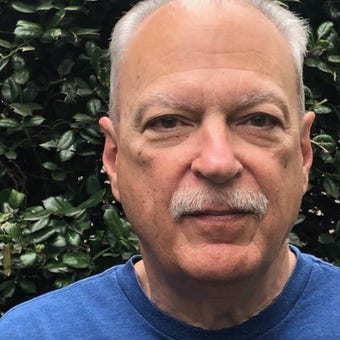Protesters take to the streets in Cuba over food, electricity shortages
Protesters in Cuba are demanding the government fix one of the worst ever economic and energy crises as blackouts and food shortages continue. CREDIT: Reuters
This essay was originally published in Discourse magazine.
On Feb. 5, Mirtza Ocana, an American citizen of Cuban origin, arrived at Tampa International Airport from Havana and was arrested for attempting to smuggle more than $100,000 into the country. When questioned, Ocana confessed to having carried out 45 similar assignments since May 2023. The smuggling operation involved millions of dollars.
Because Cuba has slipped beneath the attention horizon of the news media, this incident attracted zero interest. Yet it posed a perplexing riddle. Cuba’s communist regime currently faces the most disastrous economic collapse in its long history of such failures. The reasons are many, but most immediately it’s a lack of foreign currency with which to buy food and fuel for the population. The Cuban economy resembles those broken-down cars from the ’50s still found on the streets of Havana: It produces little for internal consumption and almost nothing that can be sold abroad for hard currency.
Why, then, is the island now exporting dollars to the United States?
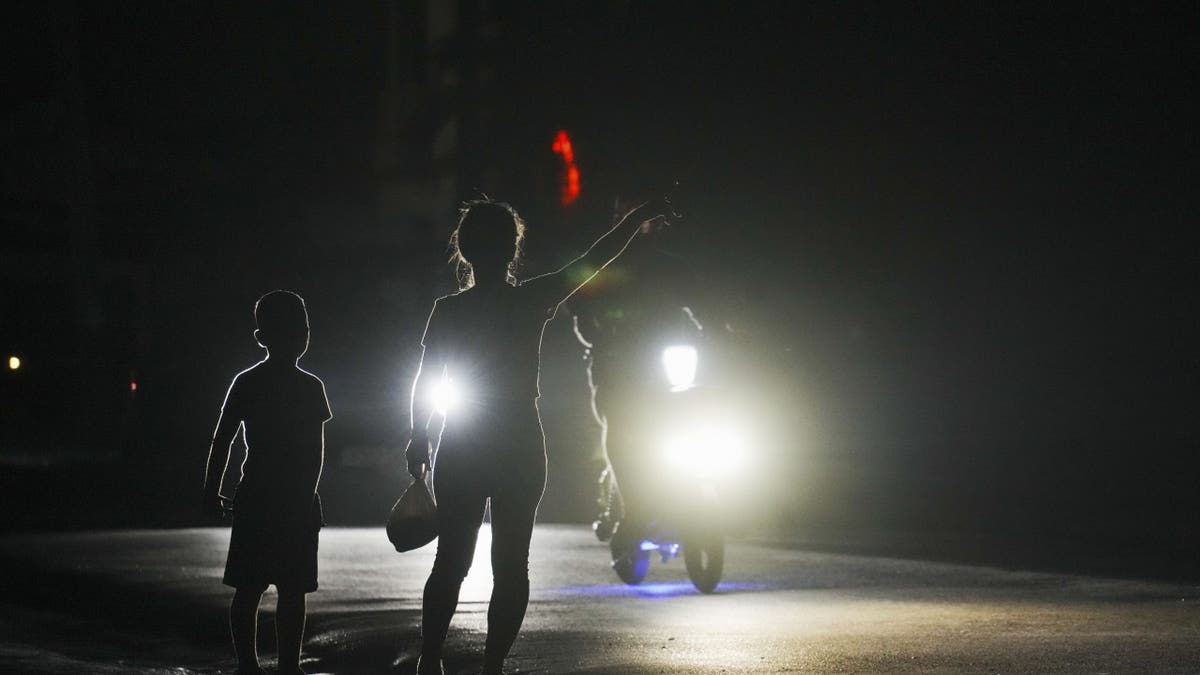
A woman and a boy attempt to hitch a ride during a scheduled power outage in Bauta, Cuba, Monday, March 18, 2024. The island is facing an energy crisis, with waves of blackouts worsening in recent weeks. (AP Photo/Ramon Espinosa)
The search for an answer leads to two radical transformations that have taken place, largely unnoticed, in Cuba. The first concerns the regime, which has given up any revolutionary pretensions and become what ordinary Cubans call a "mafia." Don’t think of the pushy American racketeers in the style of "Godfather II." The mafia in Cuba is indistinguishable from the regime itself. The matter is naturally shrouded by fictions and smokescreens, but the godfather may well be the country’s president, Miguel Díaz-Canel.
TRUMP SUGGESTS REGIME CHANGE IN COMMUNIST CUBA AS ECONOMY WORSENS
Outwardly, nothing has changed. The worn-out slogans are still piously intoned. The Communist Party, with its repressive apparatus, still dodders on. Raúl Castro, 92, remains a shadowy but frightening presence. But new people are in charge of ruling a society that, top to bottom, has lost all faith in the system – and, as often happens in moments of exhausted zealotry, those who command power and resources want nothing more than to enjoy the good life and protect themselves against an uncertain future.
The Mafia of Cienfuegos: A Case Study
The machinations of the mafia are transparent to most Cubans. In a remarkable 24-minute video titled "The Mafia of Cienfuegos," digital dissident Yamil Cuéllar calls out mafia members by name, shows their photos, reveals addresses and exposes methods in detail, linking high officials in the provincial government of Cienfuegos, a city and province on the south-central coast of the island. Cuéllar’s targets include the province’s governor, local chiefs of the Ministry of Interior and Military Counterintelligence and, ultimately, the biggest fish in Cuba’s ruling structure, Prime Minister Manuel Marrero Cruz and Díaz-Canel himself.
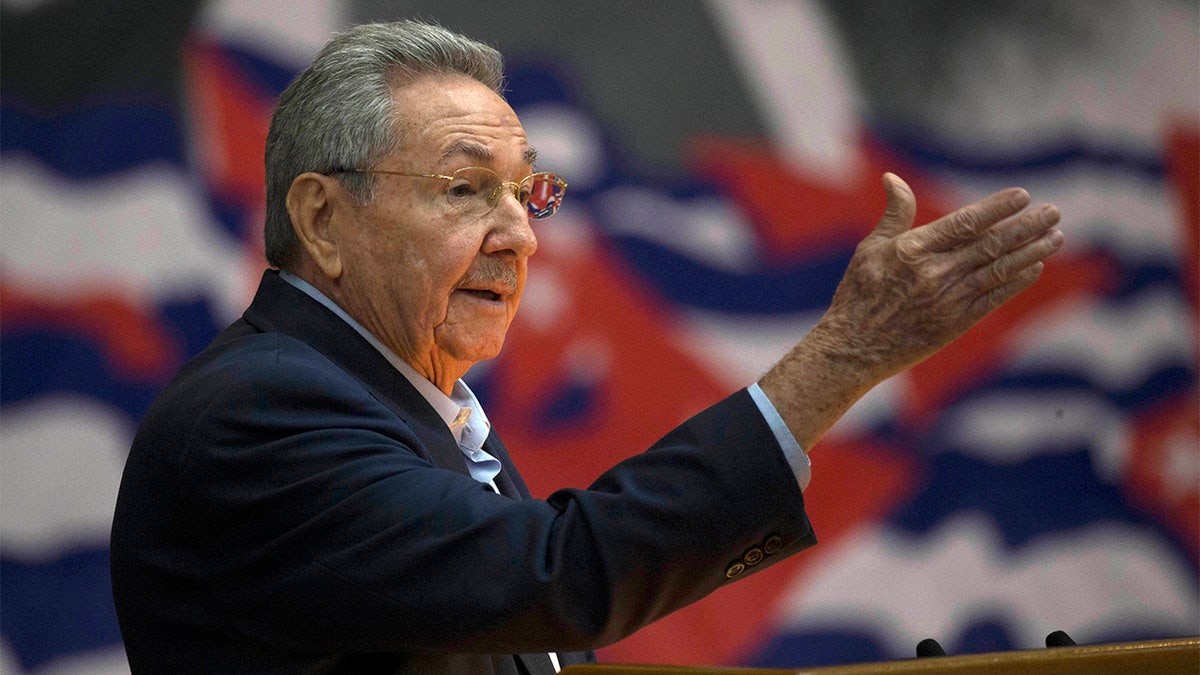
Cuba's President Raul Castro addresses the Cuban Communist Party Congress in Havana on April 16, 2016. (Ismael Francisco/Cubadebate via AP File)
Corruption can be simple or complex. Officials fortunate enough to have control over scarce resources like fuel sell these on the black market and realize enormous profits. The preferred approach is more indirect, however. Following the outbreak of anti-regime protests in July 2021, the government allowed the establishment of private "micro, small, and medium enterprises," theoretically as a way to open up the economy to market forces. But most if not all of the 9,000 private enterprises operating in Cuba today are owned by powerful regime figures who then funnel public works contracts to them.
This is an old game in Latin America. The governor of Cienfuegos can invoke an urban preservation law to raze a city block and award the rebuilding contract to an enterprise he himself owns, netting two million pesos in the bargain. In his video, Cuéllar cites many such maneuvers. Even by Cuban standards, astonishing amounts of money are flowing to the peak of the political pyramid.
Where does the money go? Some of it buys what passes for the good life in Cuba. The vast majority of the island’s inhabitants, we must remember, subsist in conditions of abysmal poverty, enduring constant power blackouts and food shortages while stuck in housing that is literally crumbling into ruins. But a thin crust at the top can afford to live in modern comfort. Even minor members of the Cienfuegos mafia dwell in new suburban-looking homes with garages, sun panels for air-conditioning and water heating and generators to avoid those pesky blackouts on cloudy days.
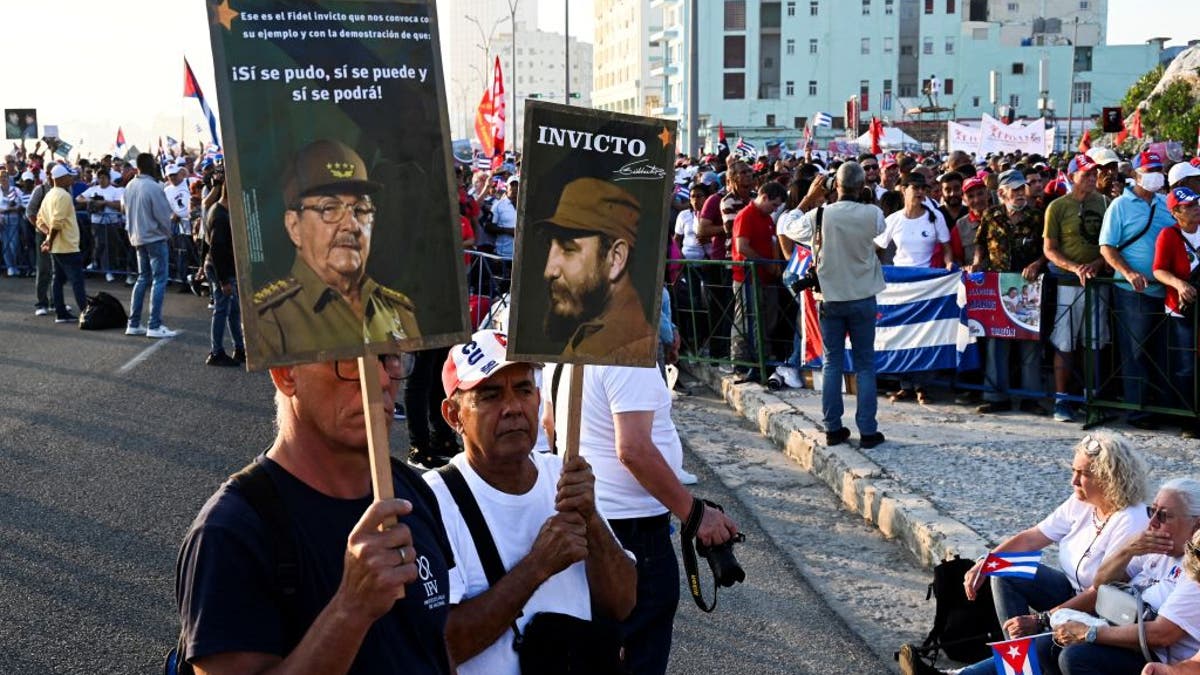
Demonstrators carry posters with images of late President Fidel Castro and former President Raul Castro during the commemoration of May Day in Havana, Cuba, on May 5, 2023. (Yamil Lage/AFP via Getty Images)
Higher-ups like the governor own luxurious residences – according to Cuéllar, designed by the minister of interior’s favorite architect – as well as places of rest and recreation at the beach and in the countryside, a magnificent sailing ship and shiny BMWs. Two palatial buildings in the city and an extensive marina are said by Cuéllar to be controlled by the country’s prime minister, Marrero Cruz. Since another money trail leads directly to president Díaz-Canel’s brother-in-law, we can safely assume that the local rackets enjoy the benevolent protection of the regime. Life is truly good for the Cienfuegos mafia.
But most of the money is converted into dollars and sent illegally out of the country. In an economic distortion possible only under late-stage dementia communism, it is likely that Cuba’s dearth of foreign currency is due to the mafia syphoning all dollars in the island then smuggling them to safe havens overseas. Cuéllar maintains that the governor’s wife, a Chamber of Commerce representative who in her official capacity frequently travels abroad, acts as the "mule" or smuggler for the Cienfuegos gang. That may or may not be the case – but it’s plain that here, at this turn of the screw, the Cuban regime’s new criminal vocation connects with the arrest at the Tampa airport. Ocana was bringing millions into the U.S. on behalf of some member of the Cuban government. That person is probably known and, as we’ll see, the revelation could trigger a crisis within the regime.
The Fall From Grace of Alejandro Gil
On Feb. 2 – three days before Ocana’s arrest – Cuba’s minister of the economy, Alejandro Gil, was abruptly dismissed from his post. Gil was the author of the "paquetazo" – a package of economic measures designed to curb inflation and bring the economy out of its tailspin, which has had the effect of further enriching the mafia and pauperizing the population. The move seemed to be an acknowledgement that the policy had failed, but Gil was still inside the fold. Four days after the dismissal, Marrero Cruz and Díaz-Canel wished him a happy 60th birthday on X, formerly known as Twitter. "I’m at your service," tweeted Gil in response.
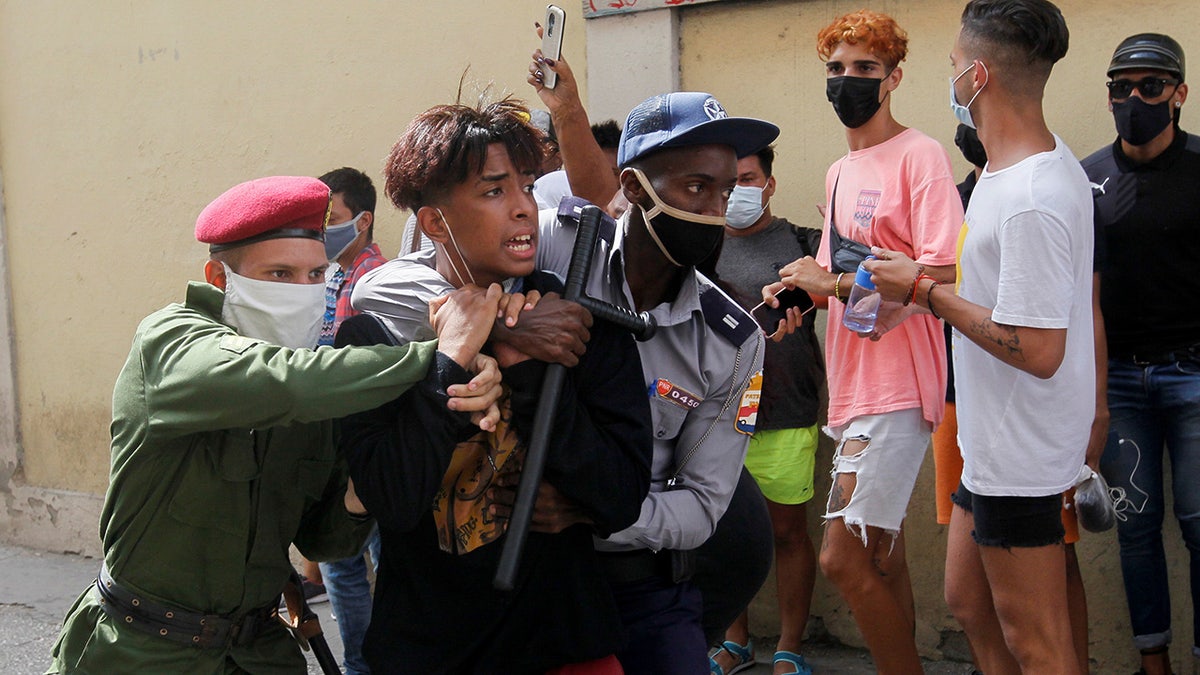
Police detain a person during protests in Havana, Cuba, July 11, 2021. (Reuters)
On March 7, he was detained. The official announcement, made public under Díaz-Canel’s name, was an indecipherable bit of verbiage that mentioned "grave errors" but no specific crimes. Yet the word "corruption" hovered over the jargon like a thundercloud. Gil hadn’t been fired for failing at his job. This was the beginning of a mafia turf war – or a communist purge: The difference is merely rhetorical. The minister of economy cuts a large figure in Cuba. Underlings who facilitated Gil’s "corruption" are certain to fall – that process has already begun. But what about enablers above the former minister?
It defies probability to imagine that Díaz-Canel and Marrero Cruz, who probably run the mafia, aren’t sneaking lots of money abroad. Even in their dotage, the Cuban security services know exactly who in the regime is going where. Whatever Gil did, it was done with the full knowledge and tacit endorsement of the power structure. So who gets purged – and why?
PROTESTS ERUPT IN SANTIAGO OVER POWER OUTAGES, FOOD SHORTAGES AS CUBA FACES ECONOMIC CRISIS
Though neither the Cuban nor the U.S. government have confirmed it, the raging rumor in Cuba is that Ocana, the Tampa smuggler, worked for Gil. It may be that the latter isn’t being punished for corruption but for being caught at it. That doesn’t alter the awkward fact of Díaz-Canel’s and Marrero Cruz’s participation, however. Their fate, I would think, rests in Raúl Castro’s hands. The old totalitarian’s last ambition should be to die in bed – but one never knows with the Castros. Raúl may wish to take down the men who replaced him at the head of the government and party, in a sort of senile revolutionary Götterdämmerung.
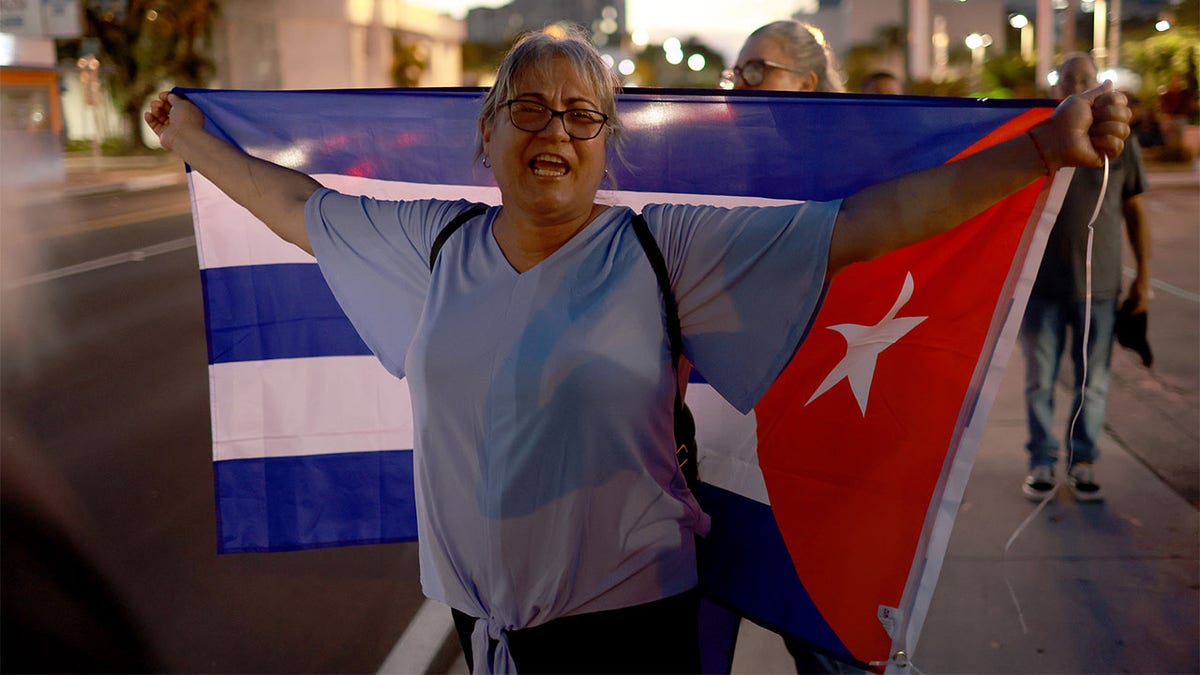
Adam Moreno joins people in the Little Havana neighborhood to show their support for the protesters in Cuba on March 18, 2024, in Miami, Florida. (Joe Raedle/Getty Images)
Why are Cuba’s rulers intent on taking their wealth out of the country? The answer should be apparent. For all their power and luxury, these people are terrified of the future. To be a member of the Cuban ruling class is to perform, every day, a high-wire act over an active volcano. Since the courage provided by ideological fervor has dissipated, the only safe move is out.
The wreckage of the Cuban economy really can’t be exaggerated. The perpetual blackouts are an apt symbol of a country that is headed for the dark ages. For the first time since the revolution, Cuba is begging the United Nations for food aid. Nearly half a million persons have fled the island in despair during the last two years – that’s 4% of the population, the equivalent of more than 12 million Americans. Yet the failure cascade is moving faster than the capacity to emigrate. People feel trapped and hopeless. The volcano is growling. Despite the words we use, national economies never actually implode – but the regimes that exploit and mismanage them often do.
Rage and Despair on the Cuban Web
At the same time, the Cuban public has found its voice. That is the second radical transformation of Cuban society. Despite the blackouts and the poor connectivity, large numbers of Cubans are venting online. I have no idea how this happens, but the web in Cuba has turned into an immense chorus of anger and disgust.
The old digital dissidents have a more professional look. Yoani Sánchez, one-time blogmother to a tiny sect of online Cubans, presently runs "14ymedio," a news site indispensable to anyone looking for reliable information about the country. The tone of the site is measured but unquestionably anti-regime.
SQUAD'S LESSON IN CUBAN SOCIALISM DIDN'T LAST LONG ENOUGH
Yamil Cuéllar, we have seen, can put together high-quality investigative documentaries, posted on YouTube, in which his contempt for the system is expressed in earthy Cubanisms. Cuéllar’s relentless attacks on the government and predictions of its imminent fall make one wonder: Why is this man not in prison? The most likely answer, once again, is a crisis of nerve at the top. Regime enforcers don’t want to be caught striking the wrong pose when the volcano blows.
Most moving are the expressions of little-known individuals trapped in the catastrophe of a failed utopia, trying to make sense of the nightmare of everyday life. Those unable to flee Cuba today escape to the web. They post on Facebook and X, they exchange links and opinions on WhatsApp, they complain of the dark and the heat and the mosquitos at night, they mock the regime, they pray to God for consolation. "How lucky we Cubans are that we can go to the web!" reads a Facebook post. "That’s the end of the state monopoly over information!" During a blackout, one poster asks, "Where can we protest?" Another answers: "Right here."
Cynicism toward the authorities is absolute. "They’re trying to do damage control and offer Alejandro Gil’s head on a silver platter." "This was a plan, this wasn’t about errors, this was a plan to destroy from within everything we had believed and built." Amid a volley of emojis, one wag claimed on Facebook that the words of the communist anthem, the "Internationale," had been written about Cubans: "Arise, wretched of the earth, stand up you slaves without bread ..."
Once the jokes and the defiance stop, we are confronted with the awful spectacle of human existence in a state of pure desperation. "Of course I’m unwell with blackouts of 15 hours one day and eight hours the next. I feel dissociated, I’m not well. I think I’m entering into insanity," a woman wrote. A poster warned: "This can’t continue indefinitely."
If, for the moment, the internet in Cuba is a refuge, it takes little imagination to see how it can become a mustering-place for revolt as has transpired elsewhere. Spontaneous protests, captured and transmitted via cellphone video, recently erupted in Santiago de Cuba, Bayamo and other cities in the east of the country. Unrest still simmers as of this moment. All that’s needed is a single mobilizing incident: a spark sufficient to ignite the conflagration.
CLICK HERE FOR MORE FOX NEWS OPINION
Meanwhile, dominos will continue to fall. In Tampa, there will be a verdict in the Ocana case and a public report from U.S. authorities, naming names. The purge will resume its erratic progress, snaring officials below, sideways and possibly above Alejandro Gil, as the regime proceeds to devour itself. Gil will be convicted out of his own mouth – probably of taking money from the CIA, so the historic monstrosity that is the Cuban economy can be blamed on "the enemy." The constellation of political and economic forces that make possible Cuéllar’s Cienfuegos mafia will lose substance, wobble and fade like a hallucination.
Karl Marx taught that the final stage of socialism is communism. We have learned from the evidence of Cuba that the terminal stage of communism is a heedless gangsterism. After that, the deluge.
